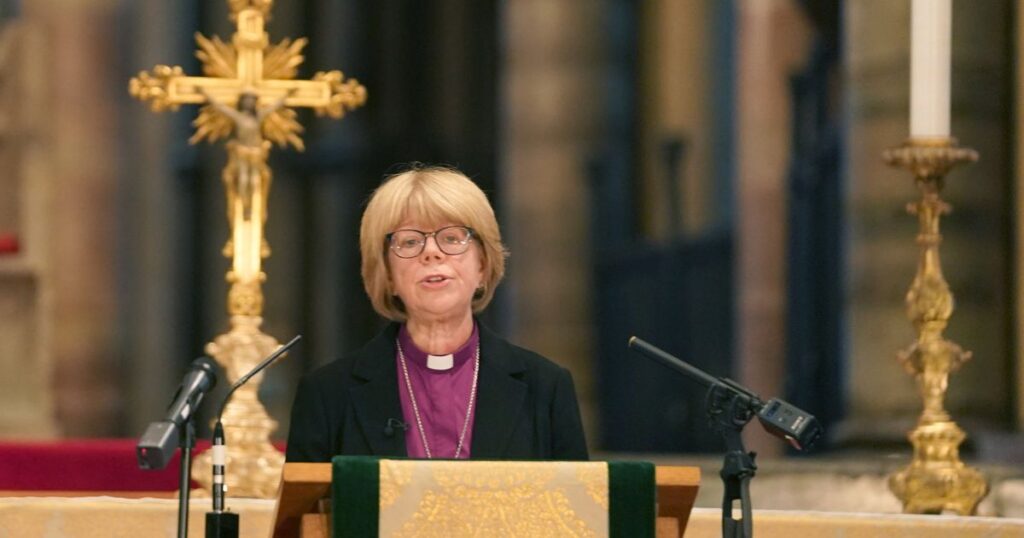LONDON (AP) — Bishop of London Sarah Mullally was announced Friday as the next Archbishop of Canterbury, the first time in 1,400 years that a woman has been chosen as the spiritual leader of the Church of England.
Mullally, 63, a former chief nursing officer for England, will face serious challenges including divisions over the treatment of women and LGBTQ people. She will also have to confront concerns that church leaders haven’t done enough to stamp out the sexual abuse scandals that have dogged the church for more than a decade.
The choice of Mullally as Archbishop of Canterbury-designate marks a major milestone for a church that ordained its first female priests in 1994 and its first female bishop in 2015. She follows 105 men who have held the role since St. Augustine became the first Archbishop of Canterbury in the year 597.
Mullally sees hope despite uncertain times
In her first remarks, Mullally spoke from a lectern at Canterbury Cathedral where she opened with a prayer and spoke of the hope she saw despite uncertain times globally and struggles within the church.
She said her first calling is to follow Christ and spread his message. But she also addressed some of the key issues facing the nation, including migration that has created a political divisions, debate over a bill in Parliament to legalize assisted dying, which she opposes, and she mentioned the “horrific violence” of Thursday’s synagogue attack in Manchester on Yom Kippur, the holiest day of the Jewish year.
“We are witnessing hatred that rises up through fractures across our communities,” Mullally said. “I know that the God who is with us draws near to those who suffer. We then, as a church, have a responsibility to be a people who stand with the Jewish community against antisemitism in all its forms. Hatred and racism of any kind cannot be allowed to tear us apart.”
She noted her place in making church history and thanked the women who had come before her, saying she intends to be a shepherd in the church to enable the faith and practices of others.
“I will not always get things right,” she said. “But I’m encouraged by the psalmist who tells us that ‘Though you stumble, you shall not fall headlong, for the Lord holds you fast by your hand.’ I trust in the truth of those words for me, for you, for the Church of England, for the nation.”
Starmer and King Charles welcome Mullally’s appointment
Prime Minister Keir Starmer welcomed the appointment of Mullally to the role and wished her success.
“The Church of England is of profound importance to this country,” Starmer said. “Its churches, cathedrals, schools and charities are part of the fabric of our communities. The Archbishop of Canterbury will play a key role in our national life.’
Mullally will replace former archbishop Justin Welby, who announced his resignation in November after an independent investigation found he failed to tell police about serial physical and sexual abuse by a volunteer at Christian summer camps as soon as he became aware of it.
“The new archbishop will be faced with declining church attendance, bloated management structures and clergy squabbling over what people do in the bedroom,” Andrew Graystone, an advocate for church abuse survivors, told Britain’s Press Association. “But the biggest challenge for the new archbishop is to restore trust after a decade of abuse scandals.”
Mullally will officially become Archbishop of Canterbury at a ceremony in Canterbury Cathedral in January and will later be enthroned in a formal ceremony likely to include members of the royal family.
King Charles III, who approved her nomination, congratulated Mullally and noted the importance of her role that will have ramifications around the world.
The Archbishop of Canterbury is first among equals
The Anglican Communion has more than 85 million members spread across 165 countries, including the Episcopal Church in the United States. While each national church has its own leader, the Archbishop of Canterbury is considered first among equals.
The process for Mullally was an 11-month marathon presided over by a committee of some 20 people chaired by the former director-general of MI5, Britain’s domestic spy agency.
“At least on the last few occasions, a new pope has been selected at great speed, but to select the Archbishop of Canterbury, which is not exactly equivalent but what many might see as a relatively equivalent position, it takes months,” said George Gross, an expert on monarchy and modern religious thought at King’s College London.
But it’s not the most transparent of processes. There was no published shortlist of candidates, nor an open vote. It was more a slow process of sounding out various interest groups to figure out which of the current bishops might be able to lead the church forward.

